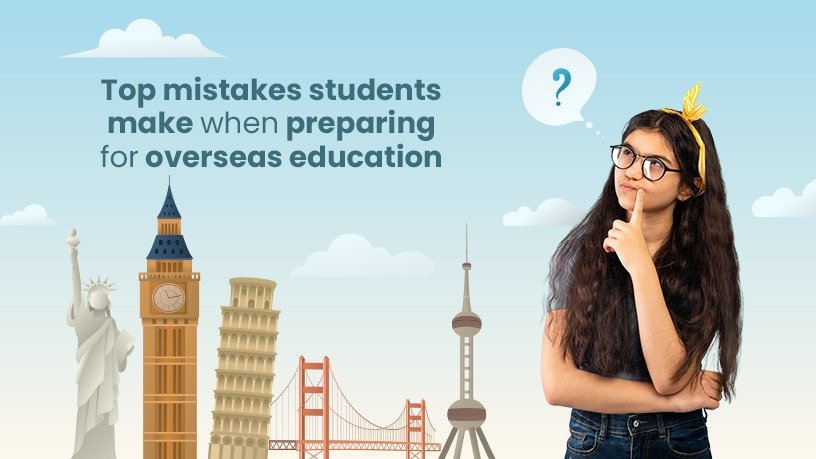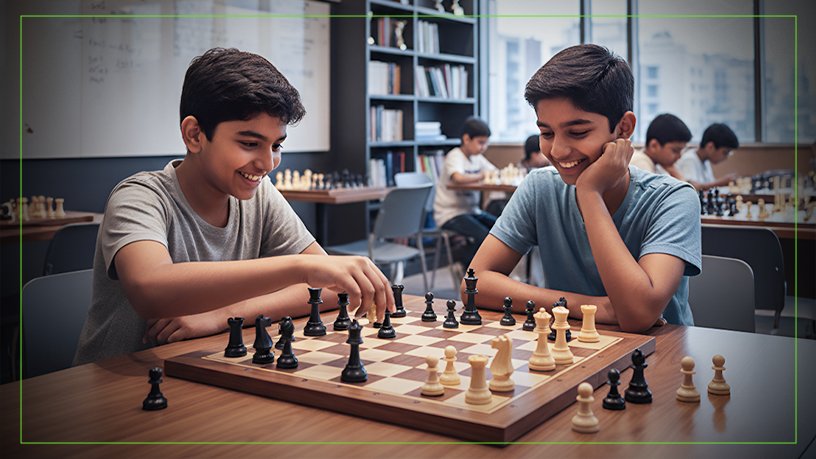Blog Details

Top Mistakes Students Make When Preparing for Overseas Education
As online education rapidly evolves, coaching classes are adapting to meet the needs of a digital-first generation of students. Virtual learning has become a vital part of education, providing flexible, accessible, and customised learning experiences that were previously unimaginable. Ziel Classes, at the forefront of this transformation, constantly integrates new trends to enhance the learning journey for students and deliver an engaging, interactive, and results-driven experience.
Below are key trends shaping the future of online coaching, highlighting how technology, pedagogy, and personalisation are redefining the educational landscape.
1. Artificial Intelligence for Customized Learning
Artificial Intelligence (AI) is reshaping online education, offering customised learning pathways tailored to each student’s strengths, weaknesses, and learning style. Through AI-driven analytics, Ziel Classes can assess student performance and adapt course material to suit individual needs. For instance, if a student excels in one subject but struggles in another, AI can suggest targeted exercises, quizzes, or review sessions.
The technology also assists in real-time feedback, allowing students to gauge their progress and take corrective actions immediately. AI-powered chatbots and virtual teaching assistants are another AI-driven addition, helping students answer routine questions, access resources, and practice concepts without waiting for an instructor’s availability. The future of online coaching is increasingly leaning towards AI-powered personalisation, ensuring each student receives the attention and support they need.
2. Gamified Learning for Increased Engagement
Gamification, or the use of game-like elements in learning, has proven effective in keeping students engaged and motivated. Ziel Classes incorporates gamified activities like quizzes, rewards, and leaderboards to make learning more interactive and enjoyable. These activities encourage students to push their limits in a healthy, competitive environment.
Students earn badges or points for completing lessons, which not only boosts their confidence but also adds a sense of accomplishment. Gamification fosters a mindset of continuous improvement and helps students retain information better, as they’re actively involved in learning. Going forward, gamified experiences will be even more immersive, blending entertainment with education for impactful learning.

3. Blended Learning Models: The Best of Both Worlds
As the boundary between offline and online learning fades, blended learning models are gaining popularity. Ziel Classes offers a combination of live online classes, recorded lectures, and in-person doubt-clearing sessions, giving students flexibility without sacrificing the benefits of face-to-face interaction. This hybrid approach allows students to learn at their own pace while receiving in-person guidance when needed.
Blended learning models provide a balanced learning experience that combines the efficiency of online resources with the personal touch of traditional coaching. This flexible approach will likely become a mainstay as students and parents increasingly seek customisable educational solutions that adapt to individual schedules and learning preferences.
4. Emphasis on Soft Skills Development
The future of online coaching is not limited to academics alone. Employers and universities today look beyond grades to assess a student’s communication, critical thinking, and problem-solving abilities. Ziel Classes is responding to this trend by incorporating soft skills training into its curriculum, helping students build essential life skills.
From teamwork exercises and time-management strategies to effective communication techniques, soft skills training is designed to complement academic learning. Students practice public speaking, group collaboration, and adaptability, all of which are crucial for professional success. This holistic approach prepares students not only for exams but also for real-world challenges, giving them a well-rounded education.
5. Virtual Reality (VR) and Augmented Reality (AR) for Immersive Learning

The use of VR and AR in education is set to transform the learning experience entirely, allowing students to immerse themselves in their subjects. Imagine learning physics concepts by visualising molecular structures in 3D or studying history by virtually "walking" through ancient cities. Ziel Classes is exploring these technologies to make complex subjects more tangible and engaging for students.
These immersive technologies will help students grasp difficult concepts faster and retain information longer as they actively interact with the material. While VR and AR adoption in online coaching is still emerging, these tools will soon make online learning more hands-on, enjoyable, and relatable for students.
6. Micro-Learning: Bite-Sized Lessons for Better Retention
In an era of short attention spans, micro-learning—delivering information in bite-sized chunks—has proven effective in helping students grasp and retain information. Ziel Classes employs micro-learning strategies, breaking down subjects into manageable sections, each focusing on a single topic. Students can complete these smaller lessons on the go, accommodating even the busiest schedules.
Micro-learning suits today’s fast-paced world and caters to students who prefer studying in shorter bursts rather than traditional hour-long classes. With the rise of mobile learning, students can access quick lessons from any device, making it easier to review material anytime and anywhere. This approach enables effective learning without overwhelming students, contributing to better overall retention.
7. Real-Time Analytics and Data-Driven Insights
Data analytics play a significant role in improving the quality of online coaching classes. By analysing metrics like student engagement, progress, and performance, Ziel Classes can identify where students may need additional help. These insights allow instructors to proactively intervene, offering personalised support and adjusting the curriculum to better meet each student’s needs.
Real-time analytics also help parents monitor their child’s academic journey, ensuring transparency and allowing them to take proactive steps if any issues arise. Data-driven insights will continue to optimise the online learning experience, making it more responsive and outcome-orientated for students and parents alike.
8. Social Learning through Online Communities
The future of online coaching is also social. Learning from peers can be just as effective as learning from instructors, and Ziel Classes is creating interactive online communities where students can discuss assignments, share ideas, and support each other. Group activities, forums, and study groups encourage collaboration and peer learning, which are crucial for developing well-rounded understanding.
These online communities also help combat isolation, one of the challenges of virtual learning, by fostering a sense of belonging and team spirit. Social learning not only enhances subject comprehension but also builds students' interpersonal skills, which are invaluable in today’s interconnected world.

9. Assessment Beyond Exams: Portfolio-Based Evaluation
Moving away from traditional exams, online coaching is embracing portfolio-based assessments to provide a more holistic view of student performance. Ziel Classes is adopting this trend by encouraging students to build portfolios of projects, presentations, and other work that showcase their skills and understanding.
Portfolio-based assessments allow students to demonstrate their learning journey, creativity, and problem-solving skills. Such a comprehensive evaluation is particularly useful for subjects requiring practical application, as it reflects students' abilities in real-world scenarios. This shift in assessment methods aligns with the future of online learning, focusing on mastery and skills rather than rote memorisation.
The future of online coaching classes is brimming with innovation and potential, driven by advancements in technology and a shift toward personalised, holistic learning experiences. At Ziel Classes, we are committed to staying at the forefront of these trends, providing students with the tools and support they need to succeed in an ever-evolving educational landscape.
From AI-driven personalisation to VR-powered immersion, the trends highlighted above are shaping a future where education is more accessible, adaptable, and engaging. As virtual classrooms continue to evolve, students and parents can expect a learning environment that not only caters to academic needs but also nurtures essential life skills, preparing students for the world beyond exams.



